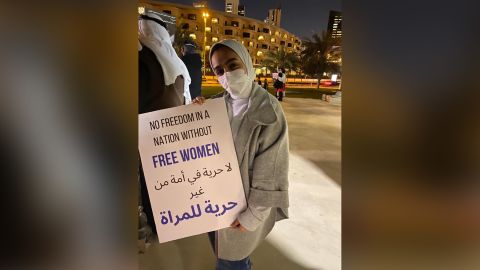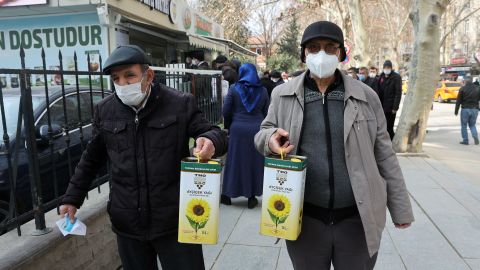Abu Dhabi, UAE
CNN
—
A Russian invasion of Ukraine would send shockwaves across Europe and perhaps as far west as the United States. But a region further south may find itself an unlikely victim of a potential conflict.
Ukraine and Russia account for 23% of the world’s wheat exports, according to S&P Global. Global food prices are already near 10-year highs and the two countries’ market share means that any disruption in exports could cause grain prices to skyrocket.
Ukraine is dubbed the breadbasket of Europe, but Middle Eastern states too have come to rely heavily on its exports – to a level that some warn has become dangerously high.
The Middle East was Ukraine’s third largest wheat buyer in the 2020/2021 market year, according to the US Department of Agriculture. More than 40% of the country’s recent wheat exports went to the Middle East or Africa alone.
The International Monetary Fund projected that energy costs and commodities prices in many countries would rise should a conflict occur. The effect on the Middle East, however, could be far worse than other countries, said Julien Barnes-Dacey, director of the Middle East and North Africa program at the European Council of Foreign Affairs.
“Fears of conflict hanging over two of the world’s major suppliers are clearly going to have some impact on prices, when there is already a sense of shortage,” he said.
Lebanon, Libya, and Egypt are among Ukraine’s biggest buyers in the region, with countries like Yemen and Syria depending on the World Food Programme’s procurement of Ukrainian wheat for aid.
Egypt, with a population of over 100 million, is the world’s largest importer of wheat. Authorities there are already warning about a shortage. Russia is Egypt’s primary supplier of wheat; Ukraine is its second.
“Skirmishes between two of the largest wheat and grains exporters in the world raises uncertainty in the market,” Minister of Supply and Internal Trade Ali Moselhy was cited as saying by state news agency MENA on Sunday.
Moselhy later told Reuters that a shortage could be covered by local suppliers for the time being, adding that he was “not concerned.”
A longer-term shortage could exacerbate an already dire food security situation in some of the region’s countries. Nearly 69 million people in the Middle East and North Africa are undernourished, according to a 2020 UN report, accounting for almost 9% of the global total. Many are in countries torn by conflict.
Hunger has been on the rise since 2014 in the region, says the UN Food and Agriculture Organization (FAO), with livelihoods plummeting after the Arab Spring uprisings and again after the Covid-19 pandemic. FAO placed the region’s prevalence of undernourishment in 2020 at 15.8%, compared to the global average of 9.9%.
“The real issue here is that there is a massive humanitarian crisis unfolding across the region, and those needs are already not being met,” said Barnes-Dacey.
States and donors might be able to procure grain from other sources but rising prices could impede an already underfunded network of importers, analysts said.
“When current needs are already going unmet, it is hard to imagine that you’ll be able to secure this massive new push needed to meet new needs,” said Barnes-Dacey, noting that the region’s most volatile states might “not even find it within the realm possibility” to secure additional sources.
Disruptions to key ports in the Black Sea, which borders both Russia and Ukraine, as well as a rise in energy costs, could compound the situation.
The region specifically “will be a major casualty of a potential conflict in [Russia and Ukraine],” World Food Programme spokesperson for the Middle East Abeer Etefa said. Wheat would be the most severely impacted commodity.
“This might be a new lesson [for Arab countries], that we must balance out procurement,” former adviser to Egypt’s supply ministry, Nadr Nour Eldin, told CNN, “So that we can always diversify and permanently secure supplies if there are ever conflicts.”
Drone from Lebanon enters Israeli airspace, the second in two days
The Israel Defense Forces (IDF) said Friday fighter jets were scrambled after a drone from Lebanon triggered sirens in northern Israel.
- Background: It is the second time in two days a drone from Lebanon has crossed into Israeli airspace, the IDF said. A drone that crossed on Thursday was shot down by troops and did not trigger any sirens.
- Why it matters: The two incidents highlight what is a growing concern among Israeli officials over the increased use of armed drones in the region. Government officials say they are worried about drone usage not just by Iranian-backed militant groups like Hezbollah, but also by drones operated directly from Iran.
US and Saudi officials discuss collaboration on market pressures should Russia invade Ukraine
Two senior US officials were in Saudi Arabia this week to discuss a “collaborative approach to managing potential market pressures,” should Russia invade Ukraine, the White House said.
- Background: The Saudis have been resistant to any changes in production because of their commitments to OPEC+, an alliance of oil-producing countries that includes Russia. Oil prices briefly touched $95 a barrel on Wednesday before paring back.
- Why it matters: War between Russia and Ukraine could significantly affect global energy markets, in particular Europe’s. US officials have been in regular discussions with a number of players about stepping up production.
Kuwait court repeals ‘imitation of opposite sex’ law
Kuwait’s constitutional court on Wednesday overturned a law that criminalized the “imitation of opposite sex.”
- Background: The law, enacted in 2007, criminalized being transgender, which was punishable by a prison sentence of up to one year, according to Amnesty. A court sentenced trans woman Maha al-Mutairi to prison last year.
- Why it matters: This will be seen as a step forward for trans rights in Kuwait, but Al-Mutairi is still in prison. Describing the decision as a “victory for trans rights,” Amnesty called for her release.
Kuwaiti yoga instructor Eman Alhusainan found herself at the center of a political debate over women’s rights after her plans to host a desert yoga retreat for women earlier this month sparked controversy among conservatives.
A heated exchange broke out in parliament when lawmaker Hamdan Al-Azmi questioned the event’s purpose and the presence of two male motivational speakers at the retreat, according to local media reports. He called the event “dangerous” and alien to Kuwaiti society on his Twitter page.
Alhusainan told CNN the Ministry of Interior subsequently stopped the retreat from taking place, attributing the cancellation to the absence of a permit. The ministry did not respond to CNN’s request for comment.


She had to postpone the retreat until she had the correct licenses, she said, adding that the “uproar” against the event was “completely unnecessary.”
Women’s rights activists pushed back, holding protests against the cancellation outside parliament. Almaha Almari, a rights activist who organized the protest, said many events take place in the desert without permits. A board member of Women’s Cultural and Social Society, Almari said the decision to cancel has more to do with curtailing women’s freedoms.
Activists are calling for a wider debate on women’s rights in the country to include topics such as women’s participation in the military and the abolishing of article 153 from Kuwait’s penal code, which categorizes “honor” murders as misdemeanors with minimal fines and jail time.
Kuwait has a “women’s problem,” Almari says. “Women’s issues are put aside by parliament. They’re ignored.”
By Tasmiyah Randeree
The US has of late moved to reassure Gulf states of its commitment to their security amid the backdrop of multiple attacks by the Iranian-backed Yemen’s Houthis on the United Arab Emirates over the last month. In the past several weeks, the US took part in one of the largest military exercises in the region.


